The days leading up to a surgical procedure are often filled with checklists and final preparations. While you focus on logistics and recovery plans, one of the most critical conversations you can have is about the pills, capsules, and remedies you take every day. It’s a common misconception that over-the-counter drugs or “natural” supplements are universally safe, but when it comes to surgery, what you don’t know can pose a significant risk. This is why understanding the necessary medications to avoid before surgery is a fundamental part of your safety.
Table of Contents
Adverse drug events are a major, and often preventable, cause of complications during and after surgery. This guide serves as your proactive resource for preoperative medication management. It is designed to help you understand why certain substances must be paused and to empower you to work alongside your medical team for the safest possible outcome. Following the latest preoperative medication guidelines is not just a suggestion; it is a vital safety protocol.
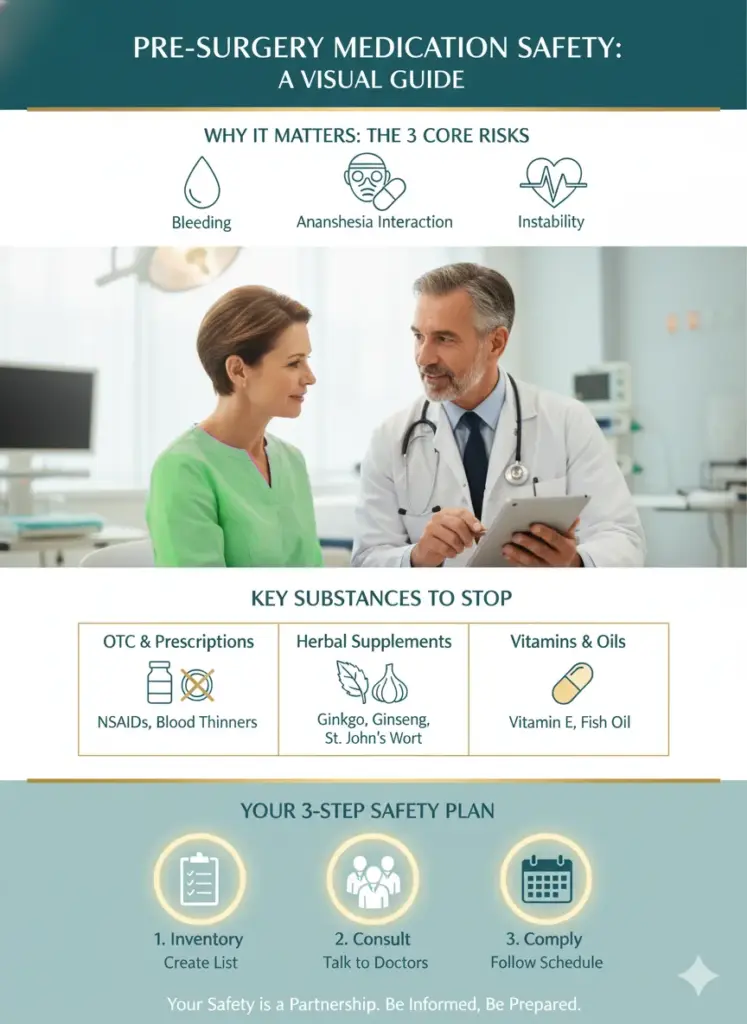
Here, we provide a definitive, evidence-based breakdown of the crucial drugs to stop before surgery. We will cover which substances pose the biggest risks, why they are a concern, and the recommended timelines for discontinuation. By understanding the complete list of supplements to stop before surgery and other key medications, you become an active partner in your own care.
The Core Risks: Why Stopping Certain Medications is Non-Negotiable
The human body undergoes immense stress during a surgical procedure, and maintaining stability is your anesthesiologist’s top priority. Certain substances can severely disrupt this delicate balance, creating dangerous and unpredictable scenarios. The primary concerns fall into three major categories, making it essential to know the specific medications to avoid before surgery.

The Danger of Uncontrolled Bleeding (Hemorrhage)
Your body’s ability to form blood clots is a remarkable and complex process, essential for controlling bleeding when tissue is cut during an operation. This process, known as the clotting cascade, involves platelets rushing to the injury site to form a temporary plug, which is then reinforced by a stronger fibrin clot. This intricate biological response is your body’s first line of defense against blood loss.
Many common medications directly interfere with this system. Antiplatelet drugs like aspirin make platelets less sticky and unable to form that initial plug effectively. Anticoagulants, or blood thinners like warfarin, work by disrupting the proteins responsible for creating the fibrin mesh. Before surgery, your doctor may order blood tests like an INR (International Normalized Ratio) to check your blood’s clotting time, especially if you are on warfarin. Leading medical journals report that failure to properly manage these medications that increase bleeding risk before surgery is a leading cause of preventable surgical bleeding events.
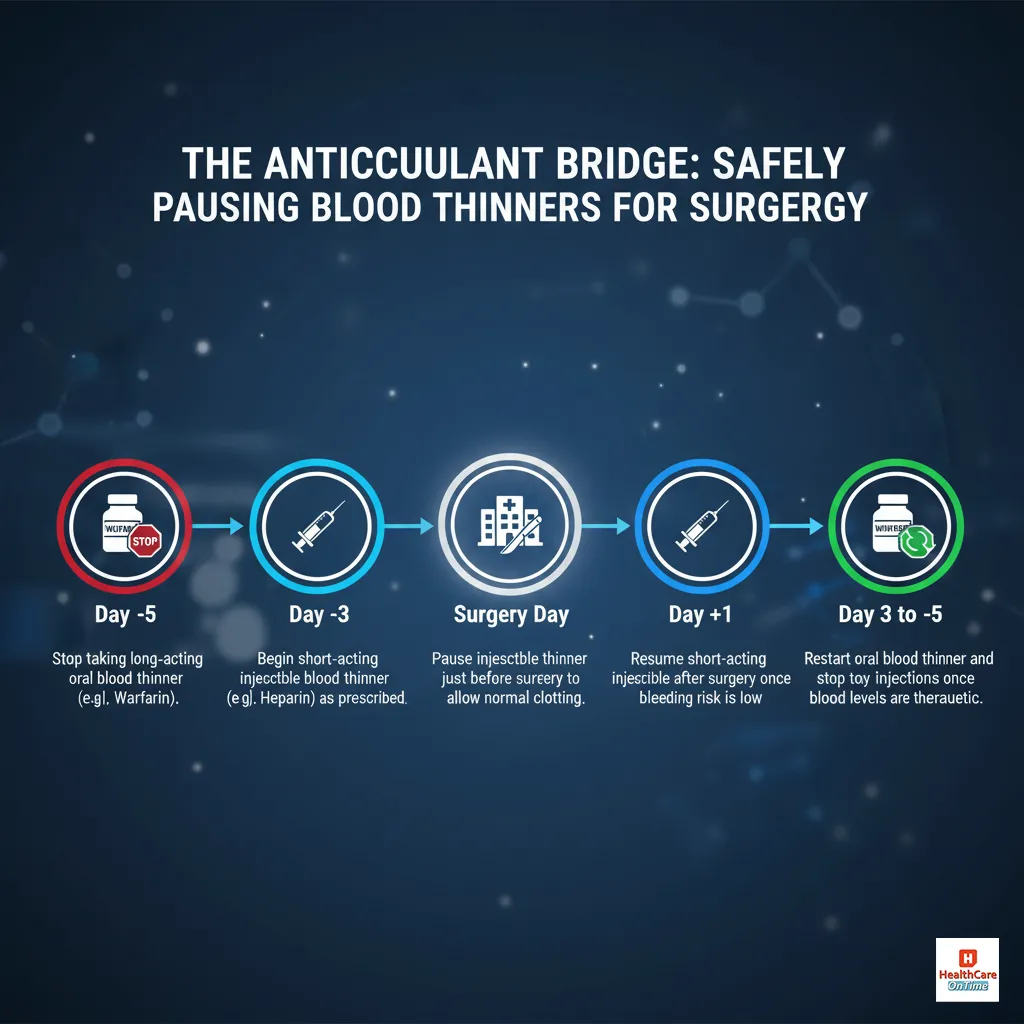
Hazardous Interactions with Anesthesia
General anesthesia is a carefully controlled medical state that requires a precise balance of potent drugs to manage consciousness, pain, and physiological functions. Some substances can create dangerous drug and supplement interactions with anesthesia, altering how your body responds in unpredictable ways. This can make the anesthesiologist’s job of keeping you safe and stable significantly more challenging.
A prime example involves certain herbal medicines affecting anesthesia. St. John’s Wort, a popular supplement for mood support, can significantly prolong the sedative effects of anesthetic agents by affecting the same liver enzymes that process the drugs. Others, like Valerian root and Kava, can dangerously enhance sedation by acting on GABA receptors in the brain, the same targets for many anesthetic drugs. Full disclosure of all herbs to avoid before surgery is therefore critical for your anesthesiologist to develop a safe plan tailored to you.

Cardiovascular and Metabolic Instability
Surgery naturally affects your heart rate, blood pressure, and blood sugar levels. Your body’s stress response, driven by hormones like cortisol and adrenaline, can cause these vital signs to fluctuate. Certain medications can amplify these fluctuations to dangerous levels, leading to a hypertensive crisis, a sudden drop in blood pressure, or severe hypoglycemia. Unstable blood pressure can reduce blood flow to vital organs like the brain and kidneys, posing a serious risk.
A key concern in modern practice involves SGLT-2 inhibitors before surgery. These diabetes medications can increase the risk of a serious condition called euglycemic ketoacidosis, which can be triggered by surgical stress even when blood sugar levels appear normal. This highlights why a thorough review of all prescriptions is a mandatory part of your pre-op preparation and why you must be transparent about every single medication you take.
The Definitive Discontinuation List: A Category-by-Category Guide
This section serves as a practical reference for the most common medications to avoid before surgery. It is essential to remember that these are general guidelines. Your personal discontinuation plan must be confirmed with your surgeon and anesthesiologist, as it will be tailored to your health history and the specific procedure you are having.
Over-the-Counter (OTC) Drugs: The Common Culprits
Many of the riskiest drugs are readily available without a prescription. This accessibility often leads patients to underestimate their potent effects on the body. Understanding NSAIDs and surgery precautions is one of the most important steps you can take for your safety.

Nonsteroidal anti-inflammatory drugs (NSAIDs) like Ibuprofen and Naproxen work by blocking COX enzymes, which reduces pain and inflammation. However, these enzymes are also crucial for platelet function. By inhibiting them, NSAIDs effectively thin the blood. In contrast, Acetaminophen (Tylenol) works through a different pathway in the central nervous system and does not typically interfere with clotting, making it a safer alternative for pain relief before surgery. These are important drugs to stop before surgery. Even some cold remedies contain NSAIDs or decongestants like pseudoephedrine that can raise blood pressure, making them risky.
Prescription Blood Thinners: Critical Management Required
For patients with a history of heart attack, stroke, or blood clots, anticoagulants and antiplatelet drugs are life-saving. However, they are also the most critical blood thinners to avoid before surgery due to the high risk of hemorrhage. Managing these requires a very specific, carefully timed plan from your medical team.
This often involves “bridging therapy” for patients on warfarin, where the long-acting oral pill is stopped several days before surgery and replaced with a short-acting injectable anticoagulant like heparin. For newer drugs like apixaban (Eliquis) and rivaroxaban (Xarelto), a simple pause of a few days is often sufficient, but the timing depends on your kidney function. Properly managing these medications that increase bleeding risk before surgery is a top priority for the surgical team.
Herbal Supplements and Vitamins: Unmasking the “Natural” Risks
Many people believe “natural” equals “safe,” but this is a dangerous assumption in a surgical context. Herbal supplements contain powerful bioactive compounds that can significantly impact your body. It’s crucial to know the main herbs to avoid before surgery, especially since they are not regulated by the FDA with the same rigor as prescription drugs.
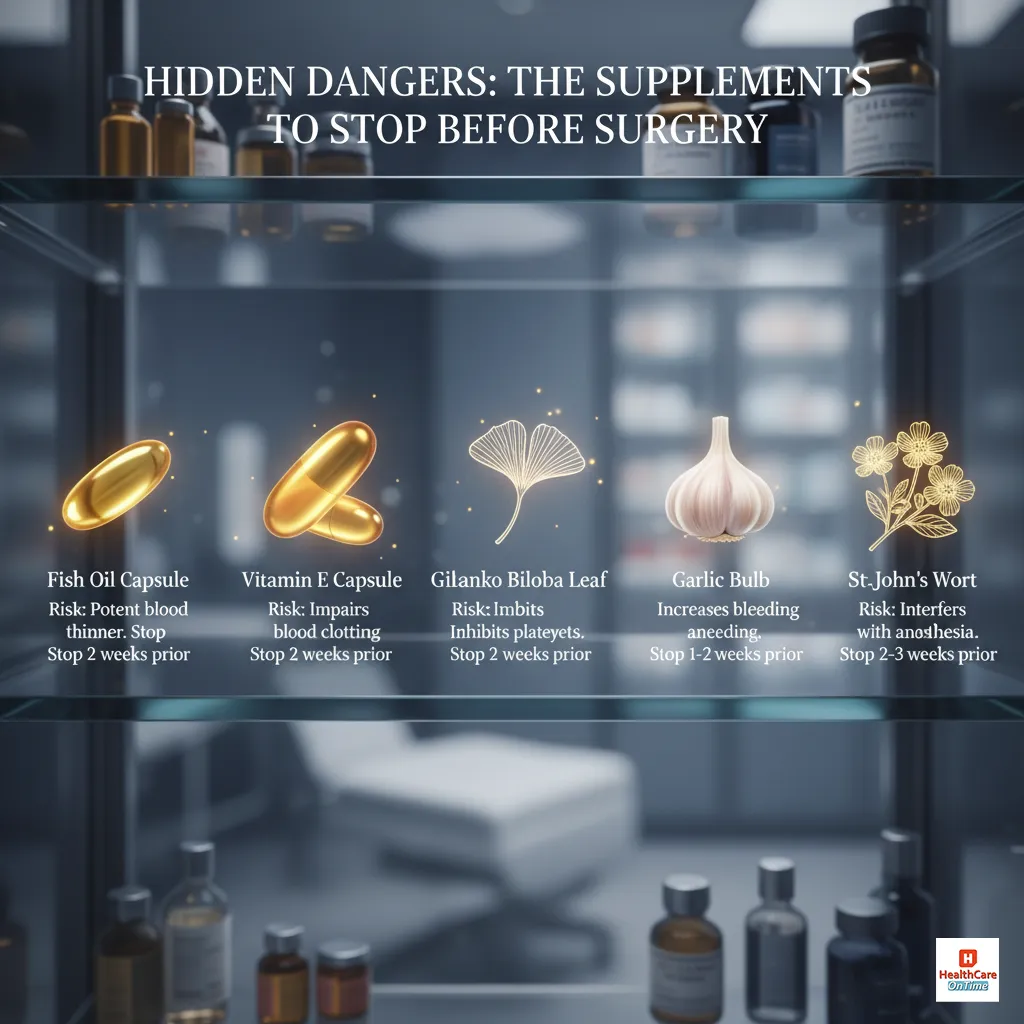
The list of supplements to stop before surgery is long and includes many common items. For example, the well-known Vitamin E and surgery bleeding risk is significant, as it strongly inhibits blood clotting. The question of when to stop fish oil before a surgical procedure is also common; its potent anti-inflammatory and blood-thinning effects necessitate stopping it well in advance. Other supplements like Dong Quai, Feverfew, and Goldenseal also carry risks. We recommend bringing the actual bottles of all supplements you take to your pre-op consultation to ensure nothing is missed.
Pre-Surgery Medication & Supplement Stop Guide
This table provides a summary based on current preoperative medication guidelines. Always confirm these timelines with your doctor.
| Medication/Supplement Category | Specific Examples | Primary Risk | Recommended Stop Timeline |
| NSAIDs | Ibuprofen (Advil), Naproxen (Aleve) | Increased Bleeding | 5-7 Days Prior |
| Antiplatelet Drugs | Aspirin, Clopidogrel (Plavix) | Increased Bleeding | 5-7 Days Prior |
| Anticoagulants | Warfarin, Eliquis, Xarelto | Severe Bleeding | 2-7 Days Prior (Requires MD Plan) |
| “Blood Thinning” Herbs | Garlic, Ginger, Ginkgo Biloba, Ginseng | Increased Bleeding | At Least 2 Weeks Prior |
| “Blood Thinning” Vitamins | Vitamin E, Fish Oil/Omega-3s | Increased Bleeding | At Least 2 Weeks Prior |
| Anesthesia-Interfering Herbs | St. John’s Wort, Valerian Root, Kava | Prolonged Sedation, Drug Interaction | 2-3 Weeks Prior |
| Diabetes Meds (SGLT-2) | Jardiance, Farxiga, Invokana | Euglycemic Ketoacidosis | 3-4 Days Prior |
| Psychotropic Meds (MAOIs) | Nardil, Parnate | Hypertensive Crisis with Anesthesia | 2-3 Weeks Prior (Specialist Guided) |
Managing Complex Prescriptions: A Condition-Specific Approach
For individuals managing chronic health conditions, medication is a daily necessity. The decision to continue or stop these prescriptions before surgery is a nuanced one, requiring careful collaboration between you, your surgeon, and your specialists. Knowing the right medications to avoid before surgery is key.
Antidepressants and Psychotropic Agents: A Risk-Benefit Analysis
The approach to managing psychotropic and antidepressant meds before surgery is highly individualized. Abruptly stopping these medications can lead to severe withdrawal symptoms or mood destabilization, which can complicate recovery. On the other hand, certain classes pose risks of drug and supplement interactions with anesthesia.
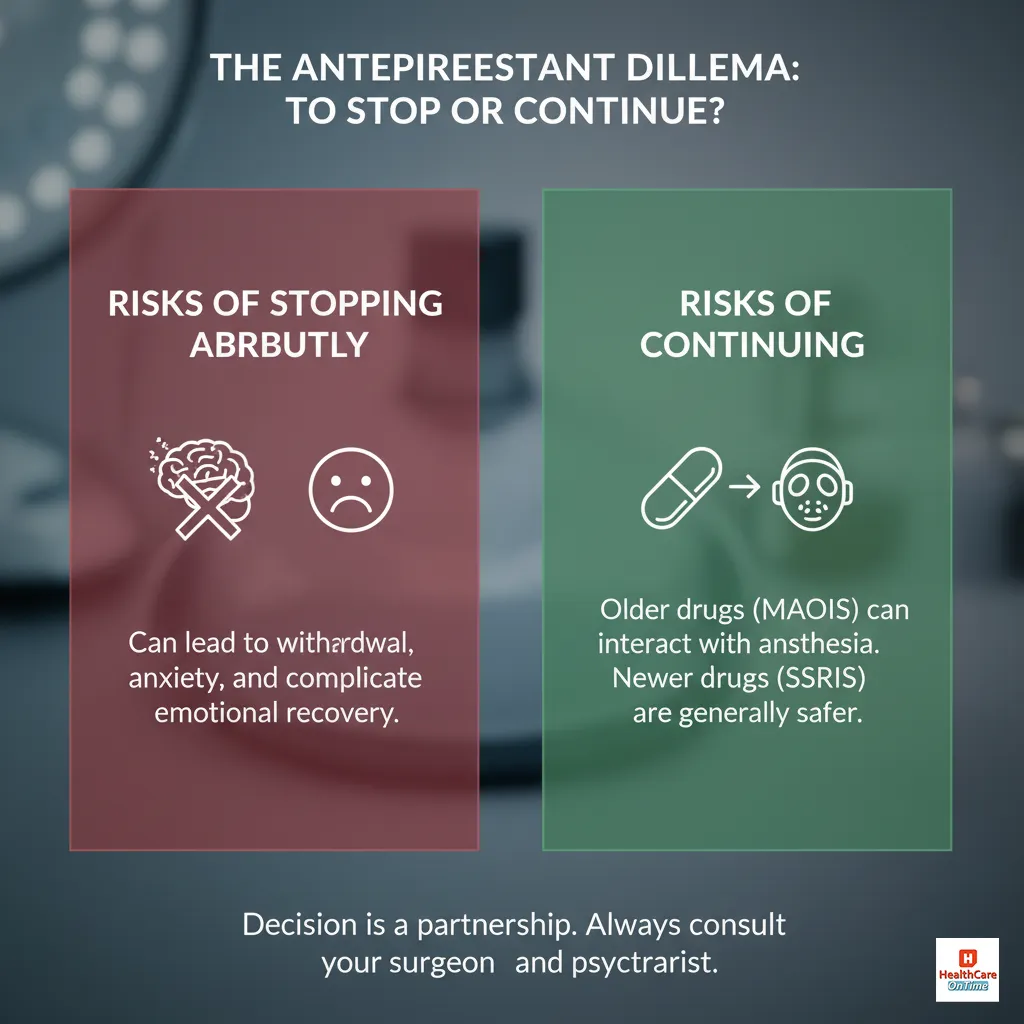
Older antidepressants, like MAOIs and tricyclic antidepressants, have a higher risk of interacting with anesthetic agents and causing dangerous blood pressure swings or even arrhythmias. For this reason, they often require a carefully managed discontinuation plan. In contrast, newer SSRIs are generally considered safer, and medical teams often prefer that patients continue taking them to maintain mood stability through the stressful surgical period. Benzodiazepines used for anxiety may also need to be tapered or adjusted.
Heart, Blood Pressure, and Diabetes Medications
Many patients ask, “Can I take my blood pressure medications on the day of surgery?” For most, the answer is yes. Medications like beta-blockers are crucial for keeping the heart rate and blood pressure stable and are often taken with a small sip of water on the morning of the procedure. They protect the heart from surgical stress. However, other classes like ACE inhibitors may be held.
The management of diabetes medication also requires a precise plan. While the focus is often on newer SGLT-2 inhibitors before surgery, insulin and other oral medications also need adjustment to prevent blood sugar from dropping too low during the pre-op fasting period. Medications for other chronic conditions, like levothyroxine for thyroid disease, are almost always continued to maintain metabolic stability.
Risk Profile of Common Medication Classes
This table summarizes the primary risks associated with different drug types, reinforcing why a comprehensive review of all medications to avoid before surgery is so important.
| Medication Type | Primary Risk: Bleeding | Primary Risk: Anesthesia Interaction | Primary Risk: Metabolic/CV Instability |
| NSAIDs (Ibuprofen) | ✅ High | Low | Low |
| Blood Thinners (Warfarin) | ✅ Very High | Low | Low |
| St. John’s Wort | Low | ✅ High | Low |
| SGLT-2 Inhibitors | Low | Low | ✅ High |
| MAOIs (Antidepressant) | Low | ✅ Very High | ✅ High |
| Beta-Blockers (Metoprolol) | Low | Low | ✅ High (if stopped) |
Your Action Plan: A Step-by-Step Guide to Medication Safety
Navigating your preoperative medication plan doesn’t have to be overwhelming. By taking a proactive and organized approach, you can ensure your medical team has all the information they need to keep you safe. This is your personal toolkit for success.
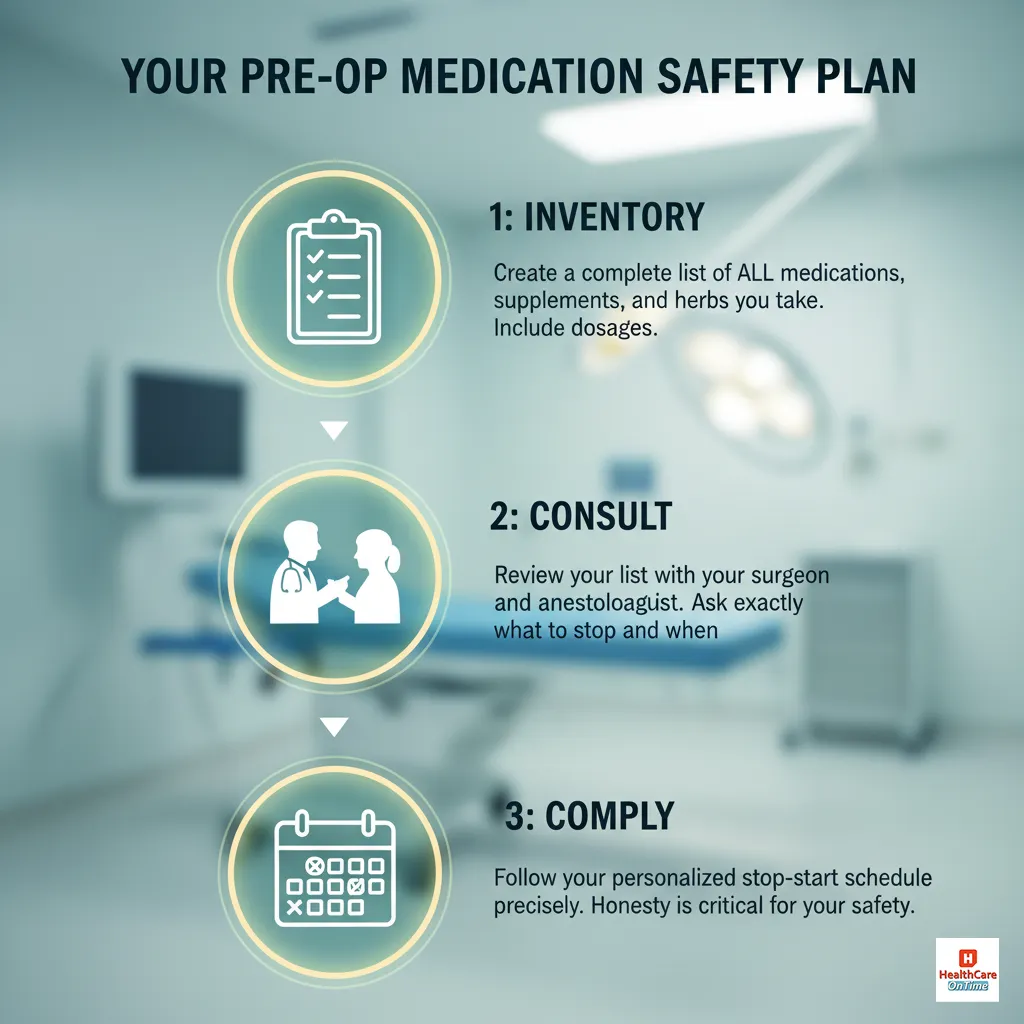
Creating Your Comprehensive Medication Inventory
Before your pre-op consultation, create a complete and detailed list of every substance you take. Do not leave anything out, no matter how insignificant it seems. Use a notebook or a notes app on your phone to keep the list accessible. You can even take pictures of the labels on each bottle as a backup.
- What to include:
- Prescription medications
- Over-the-counter drugs (pain relievers, allergy pills, etc.)
- Vitamins and mineral supplements
- Herbal remedies and teas
- CBD products and medical marijuana
- For each item, write down: The exact name, the dosage, how often you take it, and the reason you take it. This level of detail is crucial for your medical team.
Navigating the Pre-Op Consultation: Asking the Right Questions
Your pre-op appointment is your dedicated time to finalize your medication plan. Bring your inventory list and be prepared to ask specific questions to avoid any confusion. Consider bringing a trusted family member or friend to help listen and take notes. You will likely speak with both the surgeon’s office and a nurse or doctor from the pre-anesthesia clinic.
- Key questions to ask:
- Which of these items are considered medications that increase bleeding risk before surgery?
- Which specific supplements to stop before surgery are on my list?
- On what exact date should I stop taking each one?
- Which medications should I take on the morning of my surgery?
- When will it be safe to restart everything after the procedure?
Addressing the “What If”: Forgetting to Stop a Medication
Mistakes happen. If you realize you have taken one of the medications to avoid before surgery after you were supposed to stop, do not hide it. Honesty is absolutely critical for your safety, and your surgical team is there to help, not to judge.

Immediately call your surgeon’s office or the hospital’s pre-op clinic and explain what you took and when. It is far better to potentially postpone your surgery than to proceed and risk a serious, life-threatening complication. This proactive communication demonstrates your commitment to a safe outcome.
Summary & Key Takeaways: Partnering in Your Own Care
Ultimately, proactive management of the medications to avoid before surgery is a cornerstone of a successful and safe procedure. This process is a shared responsibility between you and your healthcare team, and your role as an informed patient is invaluable.
Remember the three primary risks: uncontrolled bleeding, hazardous interactions with anesthesia, and cardiovascular instability. The key to mitigating these dangers lies in following three simple steps: creating a complete medication inventory, having a detailed consultation with your medical team, and strictly complying with your personalized discontinuation plan. By taking these actions, you transition from being a passive patient to an active, empowered partner in your own surgical journey.
Frequently Asked Questions (FAQs)
What common drugs increase surgery bleeding risk?
The most common drugs that increase bleeding risk are NSAIDs like Ibuprofen (Advil) and Naproxen (Aleve), antiplatelet drugs like Aspirin and Clopidogrel (Plavix), and anticoagulants like Warfarin and Eliquis. Many herbal supplements also pose a significant risk.
When should I stop taking herbal supplements before surgery?
As a general safety rule, you should stop taking all herbal supplements, including fish oil and vitamin E, at least two weeks before your scheduled surgery. This ensures they have fully cleared from your system, minimizing any potential drug and supplement interactions with anesthesia or bleeding.
Can I take my blood pressure medications on the day of surgery?
In most cases, yes. It is often recommended to take essential blood pressure medications (like beta-blockers) with a small sip of water on the morning of surgery to maintain stability. However, some types, like ACE inhibitors, may be held. Always follow your doctor’s specific instructions.
How do antidepressants affect anesthesia safety?
The impact depends on the type. Older antidepressants like MAOIs can have serious interactions with anesthetic agents. Newer SSRIs are generally safer, and continuing them is often recommended to prevent withdrawal and maintain mood stability. This is a critical topic for your pre-op discussion.
Is it safe to take a multivitamin before surgery?
It is safest to stop your multivitamin 7 to 14 days before surgery. Many multivitamins contain Vitamin E, which can increase bleeding risk. Discontinuing it ensures there are no hidden ingredients that could cause complications.
Which supplements are known to interfere with blood clotting?
The most potent supplements that interfere with blood clotting are Fish Oil (Omega-3s), Vitamin E, Garlic, Ginger, Ginkgo Biloba, and Ginseng. These are all critical supplements to stop before surgery.
How do I discuss medication management effectively with my surgeon?
Create a comprehensive written list of everything you take and bring it to your pre-op appointment. Ask direct questions about what to stop, on what date to stop, and when to restart. Taking notes during the conversation will help you remember the specific plan.
What happens if I don’t stop certain medications before surgery?
Failing to follow your discontinuation plan can lead to severe complications. These include uncontrollable bleeding during the procedure, dangerous drops or spikes in blood pressure, and unpredictable reactions to anesthesia. For your own safety, your surgery might be canceled if you have not followed instructions.
Is Tylenol (Acetaminophen) safe to take before surgery?
Yes, in recommended doses, Tylenol is generally considered the safest over-the-counter pain reliever to take before surgery because it does not interfere with blood clotting, unlike NSAIDs.
When is it safe to resume fish oil after a surgical procedure?
You should not restart fish oil or other blood-thinning supplements until your surgeon explicitly clears you to do so. This is typically after the risk of post-operative bleeding has passed, which can be a week or more after your procedure.
Do I need to stop taking CBD or medical marijuana before surgery?
Yes. Both CBD and marijuana can interact with anesthetic drugs, potentially increasing sedation or causing unpredictable cardiovascular effects. You must inform your anesthesiologist of your use and follow their guidance on when to stop.
Are there any medications I absolutely must take on the morning of surgery?
Yes. Critical medications, such as those for blood pressure (beta-blockers), heart conditions, or anti-seizure medications, are usually taken with a small sip of water on the morning of surgery to maintain your stability. Your medical team will give you a clear list of what to take.









